Probably the main criticism that Jill Soloway‘s groundbreaking and award-winning show Transparent faces is that its main character, a transgender woman, is played by a cisgender man, Emmy winner Jeffrey Tambor, and that the show exists through a cis lens. While these criticisms are valid (as we were reminded by the recent New Yorker profile of Soloway), the show also is creating a never-before-seen version of trans representation and trans involvement in Hollywood. Soloway and Tambor may be the faces of the show, but its body is very much made up of trans people.
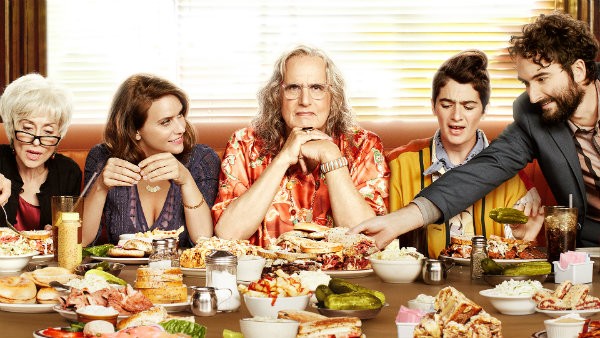
When I visited the set this summer I immediately saw other trans people — some actors, some crew members — all of them completely at home in their element. Here being trans didn’t make you the other; it made you a valued and respected part of the family. This was one of the few truly queernormative and even transnormative spaces I’ve ever been in. My transness, and the transness of the many other trans people on the set, was recognized — this wasn’t a genderblind community — but it wasn’t something that made me an outsider. I felt like an insider in a large group of people for one of the few times in my life.
Rain Valdez, a trans woman who works in the Accounting Department, felt the same. “At times, I felt like I was one of the cool kids. I think that had to do with the content of the show and the nature of the working environment created by our leaders [Soloway, Zackary Drucker and Rhys Easrnest],” she said, “Being one of the cool kids is a privilege I never had growing up, especially in school. I was one of the outcasts because I was different. So on Transparent, it’s like the tables have turned.”
This ethos of respecting trans identities, not othering them, extends beyond just the set. Both in the world of the show and in Hollywood, Transparent is hoping to make sure that trans people are in charge of, and profiting off of, their stories.
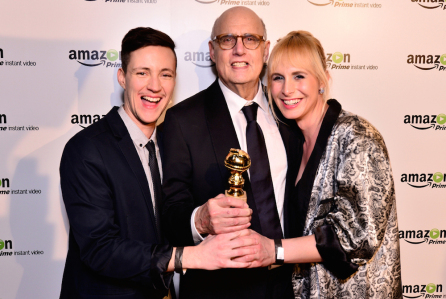
Rhys Ernst, Jeffrey Tambor, and Zackary Drucker. (Photo by Jerod Harris/Getty Images for Amazon Studios)
From the beginning of the show’s conception, Soloway has been committed to doing her best to get things right. She reached out to Rhys Ernst and Zackary Drucker, two trans artists who have worked as consultants and producers on Transparent, when the pilot was still just a script.
“We came in and had a meeting with her and were really super impressed with where she was at with her level of thought about trans issues and politics,” Ernst told me. “Jill really completely from day one understood that trans people need to be involved in a compelling way on this project. And I commend her for on that foresight, because it’s pretty rare. In most other productions in Hollywood, you see a ‘symbolic trans consultant’; they can take or leave their advice.”
With Ernst and Drucker involved so early on, and Soloway committed to including trans people in every step of the creative process, they were able to “sow these seeds that have then grown into much larger steps into trans inclusivity,” as Ernst put it. They’ve hired trans women, like Valdez, Natasha London in the costume department and, after the first season, Our Lady J as the show’s first trans staff writer. While the main role of Maura is played by cis male actor Jeffrey Tambor, Transparent has also had more trans actors on screen than maybe any show ever. Not only do they have people like Alexandra Billings, Trace Lysette and, this season, newcomer Hari Nef playing significant roles, but many other speaking and non-speaking roles are filled by trans people.
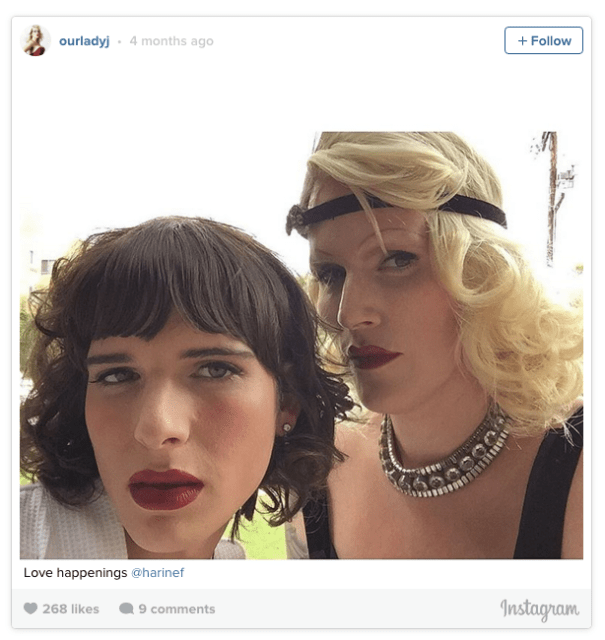
In this way, Transparent is hoping to create a new trend in Hollywood. One where trans people get to be a part of their own stories, where trans people get a piece of the money that’s being made off of their struggles. Ernst says he specifically hopes that other productions will look to Transparent and start to follow their lead. “There’s starting to become a sense that other productions need to hire trans people, and they’re starting to scratch their heads and say ‘Oh, we don’t have a trans person on our crew and we’re making a trans story, that’s a problem,'” Ernst said.
“I hope it also connects to other issues of intersectionality in Hollywood, because diversity is a big issue in Hollywood, period; and obviously in terms of women in Hollywood and people of color in Hollywood, and people who just had less access to being at the table or participating. So I think it’s a really exciting moment we’re having with all this. I hope it’s the beginning and not just a moment.”
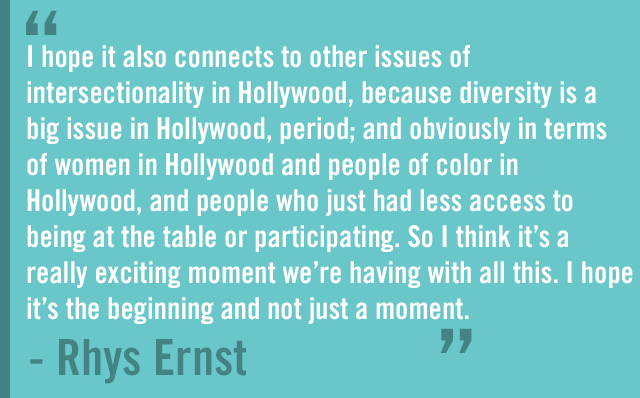
It’s no secret that many trans women struggle to find jobs that accept them, so for this show to hire so many trans women and create a space where they can be themselves is something quite revolutionary. London told me that working on the show gives her the encouragement to be her true self. “It’s so uplifting and it gives you such a sense of confidence that you can’t really get anywhere else right now. You really feel like for once you don’t have to hide anything and that’s such a game changer.”
Valdez said from working on Transparent, she’s felt a freedom that she didn’t feel in her previous jobs. “I don’t feel as lonely. I’m also able to make deeper connections with some of my co-workers and colleagues because they’ve gotten to know the real me and actually still like working with me. That’s a special feeling in itself, one that I never had in most of my past jobs.”
For Valdez, working on Transparent was the first time she was openly out as a trans woman at her job. “In fear of discrimination or losing my job, I felt I had to withhold that part of information about me. I kept it secret for a very long time because I wanted a career in this industry and I didn’t want being trans to get in the way of that. Fortunately, and I don’t say that lightly because I consider myself to be very lucky, I am a trans woman with ‘passing privilege’ and so I was able to live ‘stealth’ most of my personal and professional life as a means of my own survival. Which sounds like a dream way to live, but you’re always compartmentalizing your emotions and separating your worlds in two — who knows versus who doesn’t know. At a certain point that can get exhausting and you just want to be entirely you. I don’t have to live like that anymore. On Transparent, I can be a trans woman and talk about it, and it’s okay.”
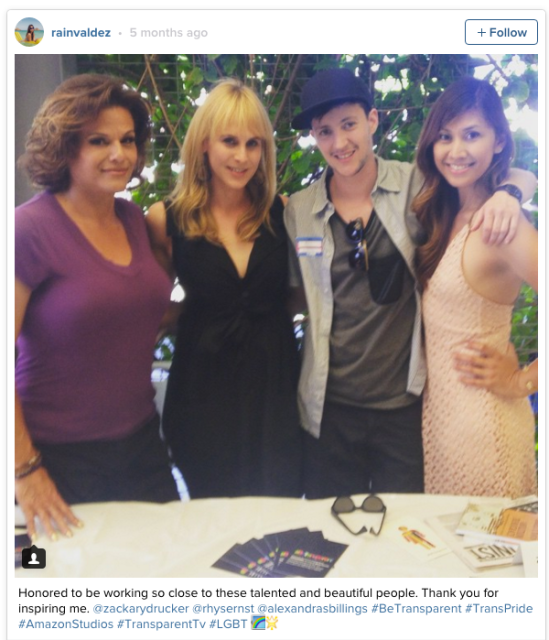
When I was on set, and every time I’ve talked to people who work on the show, it’s clear the show has no intention of otherizing trans people. Ernst says that this is deliberate. “Jill talks a lot about ‘privileging the other’ and that’s amazing coming from a showrunner. To me, one of the next steps in trans representation is situating trans people within larger narratives in which they’re not just reduced to their transition or the fact that they’re trans. They’re three dimensional characters with different aspects of their lives or families or relationships.” For Ernst, though, that’s just the first of the next steps.
“I think the other side of the future of trans representation is enabling trans authors, filmmakers, writers, producers, directors, wardrobe, costume designers, etc. into the chain. I think that’s going to take some time, because when you’ve had people excluded forever, going from zero to sixty, suddenly running a show from your first day on the job, you know, I think it’s a long game. I give a lot of credit to Jill, and it’s not just lip service. I’m grateful for the precedent she’s set being a Hollywood insider, which she didn’t really have to, by any means. The way she’s just kind of invested in the trans crew people and helping them in their careers and moving them up has just been sowing the seeds for a lot of future change too.”
Including so many trans people in the production of the show gives these very talented trans people a chance to show other people in the industry what they can do. For many trans people, it’s a lack of opportunity, not talent that holds them back. Nef wants to see other parts of Hollywood to start recognizing talented trans people the way Transparent does.
“This season we have a trans writer (Our Lady J), a trans director (Silas Howard), and a few other trans actors with major roles other than me, [Alexandra Billings, and Trace Lysette]. We’re good, we’re professional — we’re trained. Our work this season proves that: One, trans people are the folks who are best at telling our stories; and two, that we can hold our own outside of trans-related content. I don’t feel entitled to every role I audition for, but I would like an audition. The ‘trans tipping point’ won’t last forever. Our work does — and will — speak for itself.”
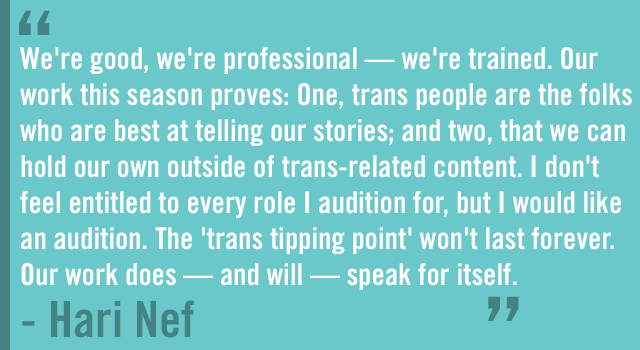
Nef told me that the presence of a large community of trans people on set and behind the scenes made everyone work better, and therefore the show is better because of it. “I’ve worked with so many great teams, but with Transparent there was a unique sense of community and safety. There were trans folks everywhere: writers, directors, actors, producers, even the PAs driving me to set in the golf cart. I’m usually the only trans person in the room, and that’s hard. The trans-firmativity of the Transparent set allowed me to do my very best work,” she said.
Drucker says that she’s even seen the Los Angeles trans community come together in new ways because of Transparent. “I feel like I’ve witnessed this entire community formation over the last two years,” she told me, “and for me it’s very attached to the show because we’ve been able to bring in so many gender non-conforming and trans actor friends, as well as bringing a lot of people onto our production team.”
It really hit her how big the Transparent trans community was when they made a video to send to Camp Aranu’tiq, a camp for trans and gender nonconforming youth. “We just did this little video with interview shout outs from the cast and all the trans crew,” she said, “and just watching it turn into a 16 minute video because there were so many of us, you know, it’s the first time I had visual evidence of the trans community that’s embedded in the production of Transparent.”
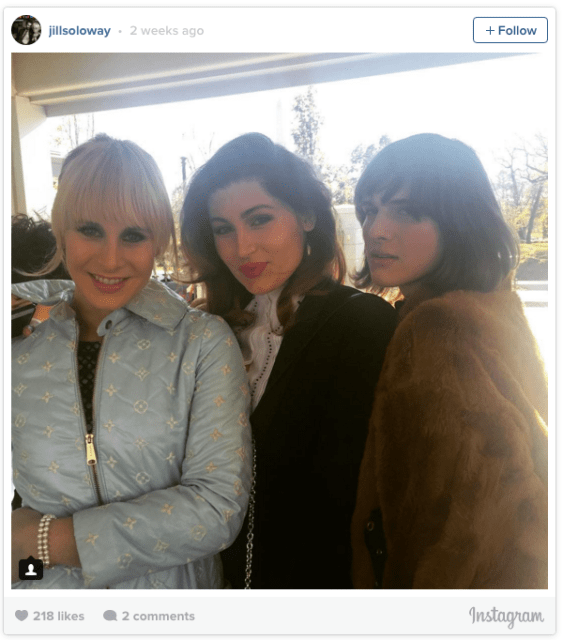
One of the reasons the show is so successful in making sure that trans people are a top priority is the way it makes sure that its cis members are mindful about trans issues. Drucker told me about how a cis crew member became a trans ally because of the lengths the show goes to make sure trans issues and people are at the are at the forefront of everyone’s minds.
“They probably would have no exposure to a trans person unless they worked on this show, but I realized that by them working on the show and reading the Trans Daily Digest — we get this email every day with a dozen headlines of what’s going on in the trans world every day, and it goes to everybody who works on Transparent — and I realized that this person is an invaluable ally, because they’re going out to their community who’s had no exposure to trans people and talking to them and challenging them on their assumptions.”
London and Valdez agreed. London said the show did a good job of providing resources and informative meetings on how to be a trans ally; Valdez also celebrated the open and everyday way trans topics were discussed.
“We would even get into discussions about the movement and what’s going on in the world,” Valdez said. “For some of my co-workers, I was able to give them a first hand experience on what it’s like for a trans person. And 99% of the time, they all could relate… because we’re not that much different. Transparent has created a space where conversations about the trans movement is a normal topic. And searching trans history in your browsers is common. The more things like this happen, the more trans people become a part of our world and our way of thinking as opposed to something that’s discrete or taboo. Transparent is bringing so many worlds together where everyone is different and unique and it’s quite acceptable.”
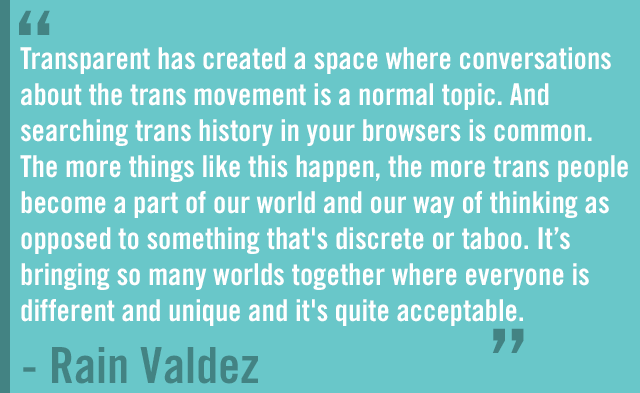
One of the people who’s been most committed to understanding and helping the trans community is the show’s star, Jeffrey Tambor. “I think that Jeffrey has been a really important ally to the community,” Drucker told me, “and he’s taking the role so seriously that it’s always been my feeling that we’re lucky to have him, because he always shines a spotlight every chance he gets. You know, he’s not easy to pin down, but any time you invite him to a community event with trans people, he’s there. In the same way that Maura has discovered the trans community, Jeffrey Tambor has as well.”
Soloway and Transparent are fully committed to listening to and valuing trans people’s stories, input, opinions and contributions. “There’s always the fear of being tokenized and not listened to,” Our Lady J, told me, “but from day one everyone really listened and took my experience in emotionally and intellectually and I feel great about it, it’s been really lovely.” She went on to talk about how the show is really setting a new precedent for involving trans people in trans stories in a very real way.
“I think Transparent is a great example of how we should be making trans art and trans storytelling. The thing that Hollywood has done in the past is to tell transgender stories from an outsider point of view, and it rarely involves a trans person. As a trans artist, I’ve been in LA for five years now and I’ve gone to countless lunches with directors and writers who ask me about my experiences, and then at the end of the day they’re profiting off of our lives, and none of us are making a penny. And we’re in a place where economically, and artistically too, we need to be empowered. So I think that the Hollywood machine needs to incorporate trans artists into every trans story that’s being told, behind the scenes, in front of the camera. I think that’s what Transparent’s doing.”
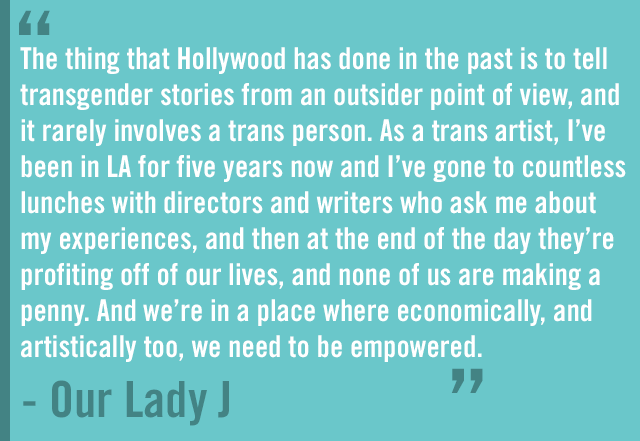
This heavy involvement from trans people has also helped to open up the world of possibilities for the characters on the show itself. While other shows and movies are stuck at a 101 — or even lower — level, Transparent is able to jump right into 301- and 401-level stories. In season two, shit gets real. Ernst told me that he, Drucker and Soloway don’t want to do any hand holding with their audience and instead want to “plunge into this waist deep.”
“I think it’s gonna be really gripping to see what the response is, because I’ve certainly never seen anything like this on TV before and I’m really nervous and excited for how it goes over, nervous in a good way,” Ernst said.
Both Ernst and Drucker are especially excited for people to see where Maura and the other trans women in her life go this season. “For me, personally, many of my closest friendships and my friend circle are other trans women,” Drucker said, “and to see Maura finding that feeling of solidarity and sisterhood and finding that camaraderie and sameness — their friendship and their bond for me is one of the most exciting parts of season two. And shooting those scenes is just really magical because they go off book, and they improvise, and the three of them, they have their own friendship that’s being captured on camera.”
Ernst told me that he’s excited to move past the transition narrative with Maura’s story. “Maura, her story this season is really a lot about her branching out, and she’s at this next stage of her internal transition. She’s kind of like, ‘I’ve sort of transitioned, now what?’ And where does that leave her? And she’s thinking about dating and what that might mean for her and what challenges there might for a lesbian, late-transitioning trans woman. One of the things I really love this season is her friendship with Shea and Davina. It’s like they’re they’re own little chosen family. And dating issues kind of crop up that way too, because Davina’s boyfriend comes back from being gone a long time, and so we see her world, being a trans woman who dates men, vs. Maura’s world.”
Drucker’s equally excited to see where the show will go. She told me that they don’t have to do 101 work anymore and can create a more complex trans character without the same amount of responsibility than they had when introducing Maura in the first season. “[We] created Maura with a lot of sensitivity to not contribute to the damaging history of representation of trans people, and that has to be done really carefully I think, because there isn’t enough out there about us, especially when you consider a mainstream audience,” she said. “I sometimes wonder if season one will be a humble beginning for a really intricate tapestry of a narrative. Culturally have been stuck on the transition narrative for so long that the nature, the form, of Transparent for both seasons creates this incredible opportunity to transcend that narrative and create a character who is trans, but is a lot of other things as well.”
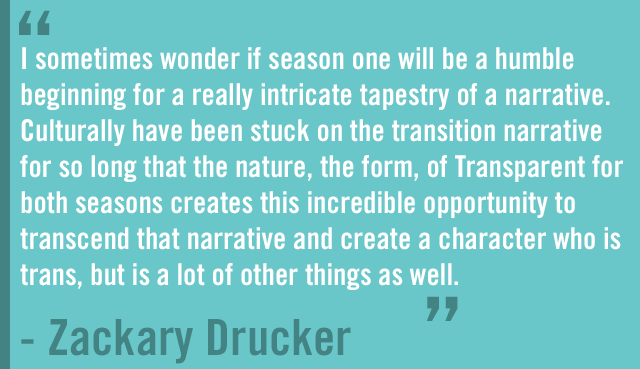
The trans characters on Transparent are able to be complicated in ways that other trans characters simply can’t be, and that’s because there are trans people behind the scenes. Drucker says that in season two they’ll be letting a trans person show a darker range of emotions occasionally. “You know, we’re assholes sometimes, it’s not like we’re perfect all the time and so we’re allowing a character to be complex.”
Our Lady J is excited that she’s able to help bring more nuance and grit to the story. “My thing is, for any show that’s dealing with trans people or any people who have been otherized or marginalized, I ask myself, ‘Is this character being represented just as every other character is?’ And as we know, every character on the show falls down, and so Maura’s gonna fall down a little bit this season. Last season she was handled with great care and respect, and I fell in love with Maura last season, and so now we get to be a little dirtier and that’s fun for me.”
In one of the most stunning new storylines this season, there are flashbacks to 1930s Berlin, the Magnus Hirschfeld’s Institut für Sexualwissenschaft, a sexology institute that was one of the most groundbreaking and earliest LGBTQ rights institutes. There we meet Gittel, played by Nef, a trans woman who was a part of Maura’s family history.
Ernst said that he was especially excited to tell this part of history because not only did it provide an insight into the Pfefferman’s family history, but because Hirschfeld’s “institute and its legacy were dismantled by the Nazis, which is so crazy, because it was this totally Utopian moment, and then basically just demolished. And it’s really a little-known history, even in the trans and queer community, that to me is like, I don’t think we’re thinking along the lines of a linear step ascension from 101 to 201 to 301, we’re just going backwards and forwards in history now and being pretty no-holds-barred, in terms of a range of queer issues.”
The scenes at the Institut für Sexualwissenschaft are some of the most beautiful and powerful scenes in the entire show, and they’re certainly more complex and impactful than most other attempts at showing trans history.
For Nef, who studied drama at Columbia and has trained at Northwestern and with Olympia Dukakis, getting to play such an important role as her first professional TV acting job was exciting. “Jill Soloway gave me a pep talk while shooting my first scene,” she said, “I think she could tell I was nervous. She said, ‘Listen, this isn’t modeling, this isn’t even acting. We’re telling a story. This girl’s story needs to be told. She’s coming up into your body. She needs you.’ That was the last word we ever spoke about acting. Jill is magic.”
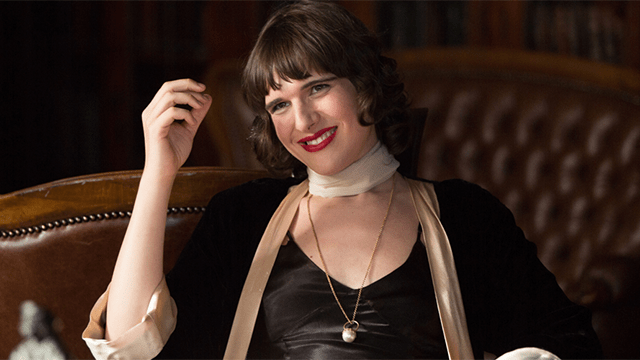
Hari Nef as Gittel in Season 2 of “Transparent.” (Courtesy Amazon Studios)
This is a whole new type of trans storytelling. Even in the recent past, with movies like Dallas Buyers Club and The Danish Girl, many trans people felt the portrayals to be inauthentic and even insulting. And that’s not even mentioning the even more dangerous and damaging portrayals that came before, and around, that.
This new type of storytelling has allowed for the show to incorporate trans people even more. Nef said that it transformed her whole experience on the set. “I could work with an open heart. Nobody was going to misgender me, the clothes were going to fit my body, the representation of transness was going to be supervised by trans people,” she said, “Sympathy is great, but empathy can make an even stronger difference in the work.”
When you’re telling more in depth and more real trans stories, you’re going to have more than just one trans person in your scenes. This season, we saw that, and for Drucker, it was a moving experience.
“We shot a scene at my favorite bar that I go to every week with all my girlfriends and all the girls from the show. We all go to this bar every weekend, it’s in the middle of nowhere, it’s like really suburban and it’s a queer trans woman who runs it, and it’s the only trans party that you go to and it’s mainly trans people. And the real thing that’s happening is this trans community that’s formed, and we were able to bring that into episode two. Maura, Davina and Shea kind of all land there. So we were recreating this club that I go to every weekend for Transparent and also being able to also pay a lot of people who don’t get paychecks often enough and putting them in front of a camera and saying, ‘We are all worthy of being represented, we are all worthy of being a part of this.'”
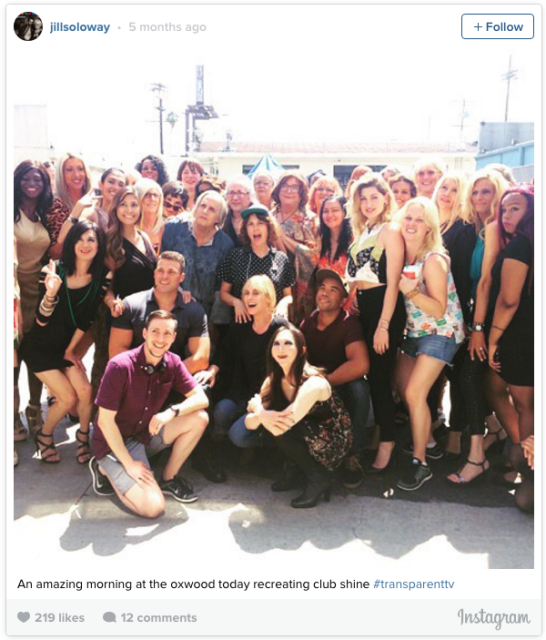
The idea that we’re all worthy of being represented and being a part of this moment was echoed throughout the cast and crew. Nef told me, “When I reblog something on Tumblr, if I relate to it strongly I add a simple, silly, caption ‘me.’ I don’t mean that literally, it just feels really good to encounter media you relate to in more than a peripheral or abstract way. When you’re a minority, perhaps it’s even more important.”
The way London sees it, Transparent is not only telling trans stories to the public, but to Hollywood as well. “The Transparent team has trans writers, actors, producers, crew members and they are really talented; I hope Hollywood is taking note of how ‘normal’ we really are. We aren’t the stereotypes, we aren’t our pasts, we are who you see before you and that’s what should count.”
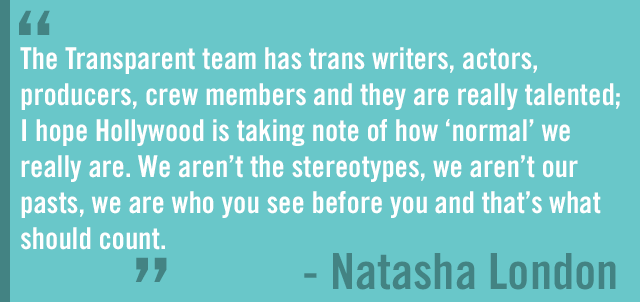
Valdez hopes that “one day this industry will no longer be treating trans people as a gimmick. Hollywood is such an influential part of the world and historically we’ve seen it make a difference. But it still needs its training wheels when it comes to trans issues. We need more shows like Transparent to set examples. We need more trans people in the creative process and in the decision making end.”
The transnormative world that Transparent is trying to create is just the start, and they know it. They’re excited to see where the tracks that they’re laying will lead. As Ernst told me, “It will be interesting in five years to watch again because this stuff is moving so fast, and who knows what the world will be like at that time.”



Mey, this was so beautifully written, and it gives me so much hope for the future of trans stories in Hollywood. I’m so excited for this season of Transparent!
What a great thing to read to start the day, thanks Mey and all involved.
Nice column.
It’s complicated for me. I try to avoid speaking for others on such things, especially since our reactions are as diverse as we are.
With that in mind, I’m one who is skittish of the parade of men who play women in trans stories. It seems as well that story focus goes to transitioned women than transitioned men, and too often the focus is on physical transformation via clothing, makeup, etc. I used makeup during the electrology phase, and avoid it like the plague now. I’m a jeans and teeshirt woman, with a boatload of love for the lesbian community that welcomed me with arms wide and actually probably saved my life.
I get people want to tell stories in order to better educate. More power to those who do, even if some element bothers me in some way, so I try to stick a sock in my mouth and accept that others see it differently.
Someone has to tell they stories. I’m a novelist, but I can’t write about it, too close to things that left me with PTSD.
I like the show in general, but I feel like it works in spite of Soloway. She’s terrible and that’s reflected in how terrible the Pfferman children are. I don’t think anybody running the show realizes they’re doing this, but they’ve done a great job of telling the story of self-absorbed, self-centered children who are making their parent a background character in her own life. Soloway lacks the self-awareness to realize how shitty that is or that it’s what she’s doing to her own parent in making her parent’s transition so much about herself that she made an entire tv show about it.
i mean… like that’s all well and good and i’m glad that trans women are getting paid, but at the same time the opinions of me and the other trans women i know of that show range from “meh” to actively disliking it.
like, it feels like the VAST majority of the excitement about this show comes from cis people that want to pat themselves on the back for how progressive they are.
and it reeaaally doesn’t help that jill soloway’s transmisogyny is like pretty well documented at this point. remember when she was posting super transmisogynist jokes about caitlyn jenner before she came out? or when like, less than a week ago, she was blaming sexism on “people with penises” which is like… directly from the TERF playbook? there’s absolutely zero chance that she works with that many trans people and doesn’t understand the implications of phrasing it like that…
i dunno.
I like the show in general, but I feel like it works in spite of Soloway. She’s terrible and that’s reflected in how terrible the Pfferman children are. I don’t think anybody running the show realizes they’re doing this, but they’ve done a great job of telling the story of self-absorbed, self-centered children who are making their parent a background character in her own life story. Soloway lacks the self-awareness to realize how shitty that is or that it’s what she’s doing to her own parent in making her parent’s transition so much about herself that she made an entire tv show about it.
I didn’t intend this comment to post twice in reply to two people, I don’t know what happened.
100 times that
You keep saying that the “writers aren’t aware” that the story revolves around the self-absorbed, narcissistic, horribly human Pfefferman clan –parents, children, and ancestors. It seems to escape you that this is literally the premise of the show? Oh man, the children make their parent an INVISIBLE background player in their own lives? It’s called TRANSPARENT, that’s the actual title of the show doubling down on the show’s intentions.
Preach. The show is a FUBAR piece of refuse – i do get the ladies doing it for money (and respect them the same way as i respect a sex worker friend, which is completely and with no judgement, quantification or ‘buts’) and am glad it exists from that point of view. Just secretly wish they had had an opportunity to do cornflakes adverts or something.
I tried watching, i couldn’t. Possibly because i know things too well and know my gf enough as to know what inspires her and what brings her down. Soloway is a butthurt princess whose entire message about her family situation is ‘lookit poor victim me’ – and it’s exactly people like her i try to demonise and dehumanise in order to provoke hate to fuel gf’s healing from her idiotic family, internalised messages and cis viewpoint (mine would not qualify, it is a transhumanist viewpoint which is a whole different thing and is inherently good and beneficial). Letting such stories be told and giving them a voice is counterproductive and this won’t be shown in my house.
And i do believe that the enormous queer community cult following of this vs none for Sense8 which involves actually interesting chars and lots of gay sex is indicative of what we (well you – i’m lesbian only by sexuality, my home cultures are industrial rave scene, scifi fandom and futurist/technocrat groups actually) as a community desire to see.
From the little I’ve watched of Transparent (a few scenes here and there; it makes me too uncomfortable to watch more), and from talking to friends who’ve seen more of it, I do wonder if there’s an intention to convey that the reason the children are so screwed up is that Maura was a distant, self-absorbed parent, and that at least part of that was due to her transness. Which upsets me, as a trans woman and parent myself.
I would not class that as an impossibility. It fits the Soloway pattern pretty well. It didn’t occur to me though, all i saw is paper-thin tokenism + your standard reality tv type attention-seeking arseholes. then i’m too old to judge and probably sound really grumpy and judgemental. When we were growing up….
Oh, Mey, what a treasure you are! This is such a rich read.
I have to admit (having just binged the whole season yesterday) that the Berlin flashback story arc grabbed me the most starkly. How wonderful to see Hirschfeld and the Institut depicted like this! I’ll be interested to see if/how that family history gets developed in the next season.
Super article, Mey! Honestly, I have not watched this show, brushing it off as another cis-version of Trans101. My eyes have been opened, thanks to you! My spouse has a Netflix account, so I’ll definitely be catching up!
x.x
Its an Amazon show, so you need a prime membership to watch it free.
You can get a trial 30-day membership of Prime, watch the show, and just be sure you make it clear you don’t wish to continue Prime at the end of the trial period (it’s all done on your Amazon account) and you won’t be charged the $99 for Prime membership at the end of the 30 days.
POSSIBLE SPOILERS:
Having binge watched season 2 I have the following observations:
The main actors are still excellent;
The show has a real problem with focus. The plots are very scattershot and numerous arcs are just jettisoned as senselessly as they were introduced;
The entire Berlin Magnus Hirschfeld thread was just silly and not at all believable, I thought it chewed up a lot of time which would have been better used expanding Maura’s arc with more depth:
Did NOT like the way the Idlewild (AKA Michfest) sequence was handled. It was presented more as Maura’s paranoia rather than actual harassment by WBW supporters. Maura’s behavior and her daughters’ naïvité were not credible;
Maura is prescribed Lupron… on what planet?;
Still way too many scenes of people getting loaded and endless dumb LA party sequences;
The trans actors still have very small roles. I thought one scene with Maura and Trace Lysette was the only one which really moved me even though I don’t believe for a second they’d ever hang or even be seen together;
Allie and Josh (while I think they’re both really well acted) remain very one note characters… and they take up an enormous amount of the series.
Amy Landecker is the best actor in the show… but her character is just so all over the place that I really don’t get where they’re going with her.
In all, I didn’t think it was an improvement over season one (if you liked season 1 you’ll probably like season 2). What was good (the acting) is still good and the trans stuff is still, IMO, not especially credible. Maura’s arc is remains relatively minor compared to the those of “the kids” and so much energy is spent on themes and threads which don’t add up to much. Your mileage may vary.
I disagree about the Berlin scenes. What exactly was not “believable” about the thread? The writers really made a great effort to add some trans history into the show and use it to portray the theme of “inherited trauma” in the Pfefferman family.
They made Hirschfeld’s Institute for Sexual Research into some kind of nightclub which is totally not what it was. It was a research institute. The entire Gittel character is completely unlike any of the trans women who came through there (many of whom worked as maids at the Institute and tended to be very low key). Nor do I believe for a second that Jews in Berlin would have names like Gittel (which is a shtetl name and not something the assimilationist Jews in Berlin would be caught dead with). I felt the entire Berlin scenes were filtered through some mannered, modern “queer-cool” lens instead of trusting the reality of time and place. Yes, got it, inherited trauma is what the series is supposed to be about. Don’t think it worked and am getting really sick of the behavior of the adult offspring being hinted that it’s all about mourning their father (as they suggested several times this season).
I’m going to refrain from saying what I really think about this whole comment except that this is exactly that type of comment I would expect from the comments section of Autostraddle.
I’m pretty sure they mention in the show that Maura’s ancestors were shtetl people/had originally immigrated to Berlin from Poland.
Like, isn’t that what Ali told Syd when they went to the library?
My family are Jews from Central/Eastern Europe and lived in both Slav dominated areas and in German speaking areas during the pre-war period. No Jewish person would move to a city like Berlin and keep the name Gittel. It just wouldn’t happen. They would be Gisela, Gertrude, Gretel, Gabriele, Gudrun… but Gittel is just not a name that a Jewish woman would have in Berlin regardless of where they were born. Maybe it’s nitpicking, but it’s indicative of how not credible I found the Berlin scenes.
It might not have been open to interpretation at all, in which case my bad, but the way I saw it was that it was a story that Ali told, based on things she read and how she imagined it would have happened. Which would be why the young girl was also the actress that played a young Ali in season 1. And why I don’t mind if it wasn’t completly accurate, Ali seems slightly crazy after all.
Here’s my take on the “Gittel” question, as someone whose mother grew up in Berlin, whose grandfather was the director from 1929-1935 of a charity devoted to helping poor Ostjuden (mostly from Poland) living in Berlin, who has spent a great deal of time over the years studying German-Jewish and Berlin Jewish history back to the 1600s (both in general and with respect to my own family), including the history of German-Jewish names, and who also happens to be trans and has read a great deal by and about Magnus Hirschfeld:
I just looked at the name index to my family tree database, and found 23 German-Jewish women there named Güttel, Güdel, Gittel, or Gedde — the most recent of whom died in 1864.
It is possible, given that German Jews often had several different first names which they used in different contexts — German, Hebrew, and Yiddish (even though Western Yiddish had essentially died out by the end of the 19th century, except in a very few rural areas) — that an assimilated German-Jewish woman (or trans woman!) living at the time of these scenes could have had Gittel or a variation of it as one of her names. But Gina is correct that it’s extraordinarily unlikely that she would have used that name generally, especially in a place like Berlin. And I don’t think it would make a difference if she were of Polish origin, because by definition she would have to be assimilated in order to be able to present as female in the first place; even a cis Polish-Jewish woman in Berlin, whose parents gave her the name Gittel when she was born, would be unlikely to use it in this context.
And that’s way more analysis than that issue is probably worth!
As for the realism of the Berlin scenes in general, or the depiction of the Hirschfeld Institute in particular, it’s hard to comment without having watched this , but from what I know about that era, it does all sound rather unrealistic. I wonder if the show even consulted any experts on Weimar Germany and/or German-Jewish history and/or Hirschfeld.
Spoiler: I really have to agree with the Michfest scene. I even had an inkling that the UCLA professor(who’s name escapes me atm) was a Michfest policy supporter. Still not sure if she’s terf/ish by the end. What I really found accurate was the hysterectomy comment, as I’ve seen terfs give similar answers to that same question on tumblr(in fact saw a similar answer just two weeks ago).
ANOTHER POSSIBLE SPOILER:
Speaking of the UCLA professor… I also had a problem with the entire bit where she accuses Maura of actively discriminating against her back in the 70s. If they have a specific historic instance of this (pre-transitioned trans woman ruining the career of lesbian cis woman) then I’d be interested in hearing it, but this version of it was: you had male privilege, were part of the men’s club and directly oppressed cis queer women while you were getting all the benefits of living as a man. And Maura, even though she’s a Professor Emeritus of Psychology at a progressive school, seemingly has zero clue or even thought about her prior behavior. As if Maura hasn’t given a whiff of consideration to issues like this, feminism, her past behavior, status, etc. They’re trying to write her character to match someone like Caitlyn Jenner, which I find offensive and crudely written. Ditto when Maura tries to pick a woman up at a bar and does it with her not too subtle MALE SOCIALIZATION (ugh)… as if she’s just some dude seeing a woman she wants to pick up. Badly written and thought through scene IMO.
Hmm that’s an interesting take, as I never really thought about comparing the character of Maura to Caitlyn But, now that you mention it there are some similarities, though it seems like Maura isn’t taking the lavish route Caitlyn is taking.
Also, it may have been cause I saw that episode at 1:30am, a bit inebriated, but when my gut feeling that festival was terf one(down to even the indigo girls singing at it). I was really worried that Maura may be the victim of something the real life things that has happened at Michfest to trans women. Ufj
To the Indigo Girls credit, although they had performed at MichFest several times, they were also one of the first high profile performers to drop out of MichFest specifically because of its WBW policy in 2013 (and made a very public statement to that effect).
Right, that whole UCLA in the ’70s thing didn’t fit with the prior characterization and Maura. It felt tacked on because somebody got the idea in their head that that should explore privilege and didn’t bother to consider of it made sense. There’s nothing in what they already established that suggested she’d have blocked the advancement of women in academia.
There were a lot of interesting ways they could have gone with the introduction of a ’70s radical lesbian feminist and the change in dynamics between then and now, but they went with the lazy option. And, in what’s a recurring problem, they made Maura the background character in her own story.
“Did NOT like the way the Idlewild (AKA Michfest) sequence was handled. It was presented more as Maura’s paranoia rather than actual harassment by WBW supporters. Maura’s behavior and her daughters’ naïvité were not credible”
I had the totally opposite understanding. I thought that by pairing that scene with the Nazi scene, it was clear that both were examples of different types of transphobic oppression. I thought the TERFy women came off as the assholes for sure. Maura had some great lines and I loved that she stomped out of the camp calling it a “feminist fuckhole”!! I was like yasss call it out. Idk if their naïvité about the trans exclusive policy was credible or not, but I do think it was presented as harassment.
Thanks for taking the time to talk about all this. I wasn’t really sure whether I could stomach another season of this, but then its been getting universal acclaim and this piece from Mey is super positive about the production behind the scenes and there were supposedly more trans actors playing other trans characters, so I was thinking it might be a lot better. But after reading this, I think maybe I’ll stay away as an act of self-care.
Warning: mild spoilers for season 2
I really enjoyed Transparent. That said, I completely understand and respect why many people didn’t.
When people ask me if I’d recommend the show I’ve told them that if you like Lena Dunham’s Girls, you’ll probably like it. That is, if you are not bothered by shows about financially well-off, self-involved, fucked up, white people, the show is probably for you. The acting is excellent, the writing is (by and large) excellent, and Maura’s character is portaryed sensitively and never made the butt of the joke. There’s a lot to like, but it is very much a show about an upper middle class white family. Maura’s life experiences differ drastically from those of most trans women, who are disporportionatly likely to endure extreme poverty due to familial rejection, employment and housing discrimination, a biased criminal justice system, mental health issues stemming from and/or intensified by near constant harassment, and many other challenges.
I think that Transparent is an excellent show, but one that is quite limited in it’s scope. Jill Soloway is the cis queer child of a transgender parent, and she has created a show that reflects her own experiences in and interesting and sophisticated way. As a white, middle class, queer person I relate to her work, but I also recognize that many, many, people will not see their experiences reflected in it whatsoever – and that’s a problem. The show recognizes that in one scene between Maura and Davina – Maura basically tells Davina that her boyfriend is a creep and she can do better, and Davina points out that as a “53 year old, ex-prostitue, HIV postive woman with a dick” she knows what her options are she doesn’t need any condesending advice from someone like Maura who hasn’t had the same sort of struggles. It’s a good scene, but the issue isn’t really explored in any depth.
The problem is that people like Davina’s character rarely get their stories told (Sophia on OITNB is about as close as it gets) and are pretty much never given a platform to create TV shows or movies that reflect their own experiences in all of their complexity. It is by and large white, cis, people like Soloway who have those opportunities.
Basically, I think Transparent is good for what it is, and probably will help wealthy and middle class cis white people to better understand and accept wealthy and middle trans white people. That isn’t nothing, but it also isn’t nearly enough. There are so many stories out there that are waiting to be told, and we need to do a much better job at giving people (especially poor trans women of color) a platform to bring those stories to the world.
As usual, you’ve nailed it. Yes, a west coast Girls with a trans subplot.
“Davina points out that as a ’53 year old, ex-prostitute, HIV positive woman with a dick’ she knows what her options are she doesn’t need any condescending advice from someone like Maura who hasn’t had the same sort of struggles. It’s a potentially excellent scene, but the issue isn’t really explored in any depth.” Nor is Maura’s reaction to what Davina said explored in any depth. On any level I would imagine Maura would have been devastated by what Davina said… but they showed nothing. Instead we got more scenes of the kids getting loaded or screwing or going to a party.
Yes, that could have a much more powerful, pivotal moment in the show, and I kind of thought they threw it away. They are trying to show how Maura doesn’t really have a group she belongs to… not in her ex-relationship, not cis people, or trans people who came from the gay men’s community. Even the trans support group she goes to the other people in it are clearly at vastly different places in their transition and from different life experiences. Got it, isolation, that’s what they’re trying to show. But it never really gets very deep. The support group scenes are little more than window dressing. Most trans people, especially older transitioners I know have had powerful experiences, both positive and negative in such groups. But these go nowhere. Nor do they ever show Maura at all concerned about, say, facial or body hair, getting electrolysis (one of the most time consuming, emotionally and physically painful and expensive parts of transition). Or concern about her voice. Nothing.
Here’s the thing, I’m a middle-to-early-senior-aged trans woman, a Californian who is Jewish, college educated, a parent, doesn’t have anywhere near the money Maura has but I’m middle class on some level… and I don’t relate to this show. She’s just too clueless and kind of dumb, I don’t believe her connections within the trans community. They could have done more, a lot more in this second season.
Thank you Dialethia & ginapdx. I’ve felt a nagging guilt that I “should” watch the show, but I just can’t bring myself to watch anything with a guy playing a trans woman. Hearing your in depth discussions of the show is wonderful, it frees me from any thoughts of watching it.
All of this sounds right to me, as a trans woman who’s only a couple of years younger than you are, Jewish, college-educated, and a parent — even though I’m a New Yorker, not a Californian! And, as someone who’s been entirely celibate (not exactly by choice), for the last 9 years, if the show ever ends up showing Maura easily “finding love,” despite being over 70 — even though the number of transitioners over 50 I’ve known, who weren’t already in a relationship when they transitioned, who’ve found somebody, is close to zero — than I never want to hear about the show again!
I still really wish there was some coverage on Autostraddle about all the Jewish aspects of the show! It is such a beautiful portrayal of a queer Jewish family, and I’m wondering if people don’t realize that? It might not be super visible to people who aren’t involved with the Jewish community, but for me its been really really important to see.
“where trans people get a piece of the money that’s being made off of their struggles.”
This part needs to be underscored multiple times and put in bold.
Filmmakers for “The Danish Girl” were lauded by The White House along with the Transparent team even though it’s been made public that the Trans consultants on “The Danish Girl” were not compensated for their services.
No matter what stated intentions are, productions that are financially exploiting Trans people should be condemned and legally investigated, not lauded and showered with awards.
I’m surely not the only one who wishes the Trans Daily Digest were available more widely? I wonder if they might consider putting it up online, or as a public mailing list.
This gives me so much hope. It’s nice to read some good news for a change re: trans rights and representation!
Oh Mey, this was excellent! I wanted to make sure I had enough time to really sit down and read it and I’m so glad I did! I’m so excited for Transparent and really look forward to its future!